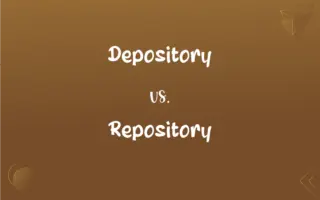Good vs. Evil: What's the Difference?
Edited by Aimie Carlson || By Janet White || Published on November 29, 2023
Good refers to qualities of morality, virtue, and beneficial nature, while evil signifies immorality, harm, or wrongdoing.

Key Differences
Good is often associated with moral righteousness, kindness, and beneficial actions. Evil, conversely, is linked with immorality, harm, and malevolent intentions.
In ethical discourse, good represents actions and qualities that are virtuous and conducive to social welfare. Evil embodies actions and qualities considered detrimental to societal and moral norms.
Philosophically, good is seen as a foundational concept that fosters harmony, cooperation, and well-being. In contrast, evil is often viewed as a disruptive force that causes suffering and discord.
Culturally, the concept of good is celebrated and aspired to, symbolizing hope and positivity. The concept of evil is often used as a cautionary element, representing fear and moral warning.
In religious contexts, good is typically aligned with divine will and benevolence, while evil is associated with malevolence and often depicted as oppositional to divine intentions.
ADVERTISEMENT
Comparison Chart
Moral Alignment
Positive, virtuous, moral
Negative, immoral, harmful
Social Impact
Beneficial, fostering harmony
Detrimental, causing discord
Philosophical View
Constructive, promoting well-being
Destructive, leading to suffering
Cultural Symbolism
Celebrated as aspirational, represents hope
Used as a caution, symbolizes fear
Religious Context
Often aligned with divine benevolence
Frequently depicted as oppositional to good
ADVERTISEMENT
Good and Evil Definitions
Good
Good is that which is morally right, just, or commendable.
Helping others is considered a universally good action.
Evil
Evil can denote something harmful or disastrous.
The hurricane caused evil destruction in its path.
Good
Good can refer to a high quality or standard.
She received a good education at the university.
Evil
Evil represents profound immorality and wickedness.
Acts of cruelty are often considered the embodiment of evil.
Good
In commerce, good refers to a commodity or item that satisfies human wants.
The store offers a variety of goods for sale.
Evil
In folklore and fiction, evil often refers to supernatural forces of harm.
The story depicted a battle between good and evil forces.
Good
Good also means beneficial or advantageous.
Regular exercise is good for your health.
Evil
In a religious context, evil is the opposite of good, often associated with the devil.
In many faiths, evil is personified by demonic figures.
Good
Good is used to express approval or satisfaction.
He did a good job on the project.
Evil
Evil can be used to describe a malevolent quality or character.
His evil intentions were hidden behind a friendly facade.
Good
Being positive or desirable in nature; not bad or poor
A good experience.
Good news from the hospital.
Evil
Morally bad or wrong; wicked
An evil tyrant.
Evil
Causing ruin, injury, or pain; harmful
The evil effects of a poor diet.
FAQs
What constitutes good in ethics?
Good in ethics often refers to actions and qualities that are morally right and beneficial.
Can the definition of good vary culturally?
Yes, what is considered good can vary based on cultural norms and values.
How is evil defined in philosophy?
In philosophy, evil is defined as that which causes harm, suffering, or moral wrongdoing.
How do religions typically portray good?
Religions often portray good as aligned with divine will, virtue, and moral righteousness.
How do societies benefit from good?
Societies benefit from good through enhanced cooperation, harmony, and wellbeing.
How do individuals develop a sense of good?
A sense of good is often developed through cultural, educational, and familial influences.
Is evil always intentional?
Not necessarily; evil can be a result of intentional actions or harmful consequences.
Is evil always opposed to good?
Traditionally, evil is seen as oppositional to good, especially in moral and ethical contexts.
Can a person be inherently good?
This is a philosophical debate; some argue for inherent goodness, others for acquired virtue.
Does the concept of evil differ in various religions?
Yes, different religions have varied interpretations and representations of evil.
Can evil actions result from good intentions?
Sometimes, actions intended for good can have unintended evil consequences.
Is good subjective or objective?
The perception of good can be both subjective (personal) and objective (universal).
Are there universal standards of evil?
While many concepts of evil are culturally specific, some aspects are seen as universally negative.
Is evil necessary to define good?
Philosophically, some argue that understanding evil is necessary to fully comprehend good.
How do laws reflect societal notions of good and evil?
Laws often reflect a society's collective understanding of good (acceptable) and evil (unacceptable) behaviors.
Can good and evil coexist?
In complex situations, elements of good and evil can coexist and intermingle.
What is moral ambiguity in the context of good and evil?
Moral ambiguity refers to situations where the distinction between good and evil is unclear.
Can the concept of evil change over time?
Yes, societal and cultural changes can influence the perception of what is considered evil.
What role does empathy play in understanding good?
Empathy is crucial in understanding good, as it fosters compassion and moral actions.
How do cultural narratives shape our understanding of good and evil?
Cultural narratives, through stories and teachings, significantly shape our perceptions of good and evil.
About Author
Written by
Janet WhiteJanet White has been an esteemed writer and blogger for Difference Wiki. Holding a Master's degree in Science and Medical Journalism from the prestigious Boston University, she has consistently demonstrated her expertise and passion for her field. When she's not immersed in her work, Janet relishes her time exercising, delving into a good book, and cherishing moments with friends and family.
Edited by
Aimie CarlsonAimie Carlson, holding a master's degree in English literature, is a fervent English language enthusiast. She lends her writing talents to Difference Wiki, a prominent website that specializes in comparisons, offering readers insightful analyses that both captivate and inform.

































































